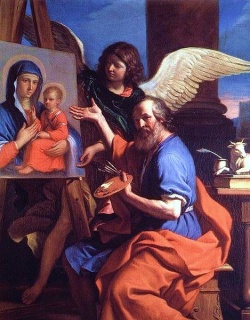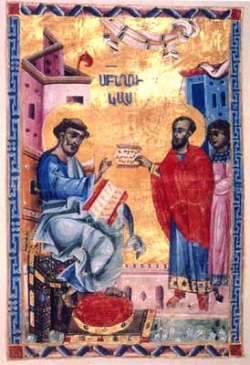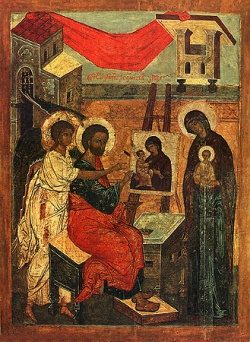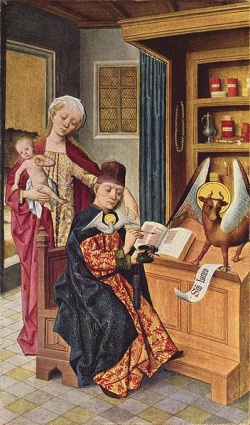Luke the Evangelist
From Textus Receptus
| Line 54: | Line 54: | ||
== See also == | == See also == | ||
| - | + | * Gospel of Luke | |
| - | + | * Acts of the Apostles | |
| - | + | * Order of St. Luke | |
| - | + | * St. Luke's | |
| - | + | * Icon of the Hodegetria | |
| - | + | * Woes of the Pharisees | |
== References == | == References == | ||
| - | + | * I. Howard Marshall. Luke: Historian and Theologian. Downers Grove, Illinois: InterVarsity Press. | |
| - | + | * F.F. Bruce, The Speeches in the Acts of the Apostles. London: The Tyndale Press, 1942.[1] | |
| - | + | * Helmut Koester. Ancient Christian Gospels. Harrisburg, Pennsylvania: Trinity Press International, 1999. | |
| - | + | * Burton L. Mack. Who Wrote the New Testament?: The Making of the Christian Myth. San Francisco, California: HarperCollins, 1996. | |
| - | + | * J. Wenham, "The Identification of Luke", Evangelical Quarterly 63 (1991), 3–44 | |
== Notes == | == Notes == | ||
| - | + | 1. "Saint Luke the Evangelist". Star Quest Production Network. http://saints.sqpn.com/saintl06.htm. Retrieved 2008-12-27. | |
| - | + | 2. The New Testament Documents: Their Origin and Early History, George Milligan, 1913, Macmillan and Co. limited, p. 149 | |
| - | + | 3. Saint Luke Catholic Online article | |
| - | + | 4. Saints: A Visual Guide, Edward Mornin, Lorna Mornin, 2006, Eerdmans Books, p. 74 | |
| - | + | 5. Saint Luke Catholic Encyclopedia article | |
| - | + | 6. New Outlook, Alfred Emanuel Smith, 1935, Outlook Pub. Co., p. 792 | |
| - | + | 7. New Testament Studies. I. Luke the Physician: The Author of the Third Gospel, Adolf von Harnack, 1907, Williams & Norgate; G.P. Putnam's Sons, p. 5 | |
| - | + | 8. A Commentary on the Original Text of the Acts of the Apostles, Horatio Balch Hackett, 1858, Gould and Lincoln; Sheldon, Blakeman & Co., p. 12 | |
| - | + | 9. Encyclopedia Britannica, Micropedia vol. 7, p. 554–555. Chicago: Encyclopedia Britannica, Inc, 1998. ISBN 0-85229-633-0. | |
| - | + | 10. Colossians 4:10 and 11, compared with 14 | |
| - | + | 11. Michael Walsh, ed. "Butler's Lives of the Saints." (HarperCollins Publishers: New York, 1991), pp. 342. | |
| - | + | 12. Grant, Robert M., "A Historical Introduction to the New Testament" (Harper and Row, 1963) http://www.religion-online.org/showchapter.asp?title=1116&C=1230 | |
| - | + | 13. Richard Bauckham, Jesus and the Eyewitnesses. 117. | |
| - | + | 14. Ramsay, BRDTNT, 222 | |
| - | + | 15. Blaiklock, The Archaeology of the New Testament, page 96, Zondervan Publishing Houst, Grand Rapids, Michigan, 1970. | |
| - | + | 16. Hemer, "The Book of Acts in the Setting of Hellenic History", 104–107, as summarized by MacDowell. | |
| - | + | 17. Johnson, Luke Timothy "The Acts of the Apostles" (The Liturgical Press, 1992), pp. 474-476, cited at http://www.earlychristianwritings.com/luke.html | |
| - | + | 18. Heard, Richard: An Introduction to the New Testament Chapter 13: The Acts of the Apostles, Harper & Brothers, 1950 http://www.religion-online.org/showbook.asp?title=531 | |
| - | + | 19. Grant, Robert M., "A Historical Introduction to the New Testament" (Harper and Row, 1963) http://www.religion-online.org/showchapter.asp?title=1116&C=1230 | |
| - | + | 20. http://www.newadvent.org/cathen/09420a.htm#VI | |
| - | + | 21. http://www.newadvent.org/cathen/01536a.htm | |
| - | + | 22. Father H. Hosten in his book Antiquities notes the following "The picture at the mount is one of the oldest, and, therefore, one of the most venerable Christian paintings to be had in India. Other traditions hold that St. Luke painted two icons which currently reside in Greece: the Theotokos Mega Spileotissa (Our Lady of the Great Cave, where supposedly St. Luke lived for a period of time in asceticism) and Panagia Soumela, and Panagia Kykkou which resides in Cyprus." | |
| - | + | 23. Brown, Raymond E. An Introduction to the New Testament, p. 267. Anchor Bible; 1st edition (October 13, 1997). ISBN 978-0385247672. | |
| - | + | 24. The Beloved Physician St. Luke, Padua. | |
| - | + | 25. Wade, Nicholas. "Body of St. Luke' Gains Credibility." New York Times, October 16, 2001. | |
Revision as of 08:02, 5 February 2010
Luke the Evangelist (Ancient Greek: Λουκᾶς Loukas) was an Early Christian writer whom the Church Fathers such as Jerome and Eusebius said was the author of the Gospel of Luke and the Acts of the Apostles.
The Roman Catholic Church venerates him as Saint Luke, patron saint of physicians, surgeons, students, butchers, and artists; his feast day is 18 October.
Contents |
Life
Saint Luke was a physician and lived in Greece in the city of Antioch.[2][3][]4[5][6][7]
His earliest notice is in Paul's Epistle to Philemon, verse 24. He is also mentioned in Colossians 4:14 and 2 Timothy 4:11, two works commonly ascribed to Paul. The next earliest account of Luke is in the Anti-Marcionite Prologue to the Gospel of Luke, a document once thought to date to the 2nd century, but which has more recently been dated to the later 4th century. Helmut Koester, however, claims that the following part – the only part preserved in the original Greek – may have been composed in the late 2nd century: “ Luke, a native of Antioch, by profession a physician.[8] He had become a disciple of the apostle Paul and later followed Paul until his [Paul's] martyrdom. Having served the Lord continuously, unmarried and without children, filled with the Holy Spirit he died at the age of 84 years. (p. 335) ”
Epiphanius states that Luke was one of the Seventy (Panarion 51.11), and John Chrysostom indicates at one point that the "brother" Paul mentions in 2 Corinthians 8:18 is either Luke or Barnabas. J. Wenham asserts that Luke was "one of the Seventy, the Emmaus disciple, Lucius of Cyrene and Paul's kinsman." Not all scholars are as confident of all of these attributes as Wenham is, not least because Luke's own statement at the beginning of the Gospel of Luke (1:1–4) freely admits that he was not an eyewitness to the events of the Gospel.
If accepted that Luke was in fact the author of the Gospel bearing his name and also the Acts of the Apostles, certain details of his personal life can be reasonably assumed. While he does exclude himself from those who were eyewitnesses to Jesus' ministry, he repeatedly uses the word "we" in describing the Pauline missions in Acts of the Apostles, indicating that he was personally there at those times.[9]
There is similar evidence that Luke resided in Troas, the province which included the ruins of ancient Troy, in that he writes in Acts in the third person about Paul and his travels until they get to Troas, where he switches to the first person plural. The "we" section of Acts continues until the group leaves Philippi, when his writing goes back to the third person. This change happens again when the group returns to Philippi. There are three "we sections" in Acts, all following this rule. Luke never stated, however, that he lived in Troas, and this is the only evidence that he did.
The composition of the writings, as well as the range of vocabulary used, indicate that the author was an educated man. The quote in the Letter of Paul to the Colossians differentiating between Luke and other colleagues "of the circumcision"[10] has caused many to speculate that this indicates Luke was a Gentile. If this were true, it would make Luke the only writer of the New Testament who can clearly be identified as not being Jewish. However, that is not the only possibility. The phrase could just as easily be used to differentiate between those Christians who strictly observed the rituals of Judaism and those who did not.[9]
Luke died at age 84 in Boeotia, according to a "fairly early and widespread tradition".[11] According to Nikiphoros-Kallistos Xanthopoulos (Eccles. History XIVth c. AD., Migne P.G. 145, 876) and others, Luke's Tomb was located in Thebes (Greece), from whence his relics were transferred to Constantinople in the year 357.
Luke as a Historian
Most scholars understand Luke's works (Luke-Acts) in the tradition of Greek historiography.[12] The preface of The Gospel of Luke (1:1-4) drawing on historical investigation is believed to have identified the work to the readers as belonging to the genre of history.[13] There is some disagreement about how best to treat Luke's writings, with some historians regarding Luke as highly accurate, and others taking a more critical approach.
Archaeologist Sir William Ramsay wrote that "Luke is a historian of the first rank; not merely are his statements of fact trustworthy...[he] should be placed along with the very greatest of historians."[14] Professor of classics at Auckland University, E.M. Blaiklock, wrote: "For accuracy of detail, and for evocation of atmosphere, Luke stands, in fact, with Thucydides. The Acts of the Apostles is not shoddy product of pious imagining, but a trustworthy record...it was the spadework of archaeology which first revealed the truth."[15] New Testament scholar Colin Hemer has made a number of advancements in understanding the historical nature and accuracy of Luke's writings.[16]
On the purpose of Acts, New Testament Scholar Luke Timothy Johnson has noted that "Luke's account is selected and shaped to suit his apologetic interests, not in defiance of but in conformity to ancient standards of historiography."[17] Such a position is shared by most commentators such as Richard Heard who sees historical deficiencies as arising from "special objects in writing and to the limitations of his sources of information." [18] Robert M. Grant has noted that although Luke saw himself within the historical tradition, his work contains a number of statistical improbabilities such as the sizable crowd addressed by Peter in Acts 4:4. He has also noted chronological difficulties whereby Luke "has Gamaliel refer to Theudas and Judas in the wrong order, and Theudas actually rebelled about a decade after Gamaliel spoke(5:36-7)'[19]
The Catholic Encyclopedia talks of Luke's 'extreme accuracy'[20], while noting that hypotheses to reconcile Luke's claim that Annas and Caiaphas were High Priest simultaneously, while 'more or less plausible', are 'not strictly accurate'[21], and the List of High Priests of Israel shows the two to be separated by two years and three incumbents.
It has also been noted that accuracy in some details does not necessarily imply accuracy in others, and vice versa.
Iconography
Another Christian tradition states that he was the first iconographer, and painted pictures of the Virgin Mary (for example, The Black Madonna of Częstochowa or Our Lady of Vladimir) and of Peter and Paul. Thus late medieval guilds of St Luke in the cities of Flanders, or the Accademia di San Luca ("Academy of St Luke") in Rome, imitated in many other European cities during the 16th century, gathered together and protected painters. The tradition that Luke painted icons of Mary and Jesus has been common, particularly in Eastern Orthodoxy. The tradition also has support from the Saint Thomas Christians of India who claim to still have one of the Theotokos icons that St Luke painted and Thomas brought to India.[22]
New Testament books
Some scholars attribute to Luke the third Gospel and the Acts of the Apostles, which is clearly meant to be read as a sequel to the Gospel account. Other scholars question Luke's authorship of these books. Many secular scholars give credit to Luke's abilities as an historian. Both books are dedicated to one Theophilus and no scholar seriously doubts that the same person wrote both works, though neither work contains the name of its author.
Many argue that the author of the book must have been a companion of the Apostle Paul, because of several passages in Acts written in the first person plural (known as the We Sections). These verses (see Acts 16:10–17, 20:5–15, 21:1–18, etc.) seem to indicate the author was traveling with Paul during parts of his journeys. Some scholars report that, of the colleagues that Paul mentions in his epistles, the process of elimination leaves Luke as the only person who fits everything known about the author of Luke/Acts.
Additionally, the earliest manuscript of the Gospel (Papyrus Bodmer XIV/XV = P75), dated circa AD 200, ascribes the work to Luke; as did Irenaeus, writing circa AD 180; and the Muratorian fragment from AD 170.[23] Scholars defending Luke's authorship say there is no reason for early Christians to attribute these works to such a minor figure if he did not in fact write them, nor is there any tradition attributing this work to any other author.
The Relics of St. Luke the Evangelist
The remains of St. Luke were brought to Padua, Italy, sometime before 1177, according to tradition.[24][25] In 1992, the then Greek Orthodox Metropolitan Ieronymos of Thebes and Levathia (currently the Archbishop of Greece) requested from Bishop Antonio Mattiazzo of Padua the return of a "a significant fragment of the relics of St. Luke to be placed on the site where the holy tomb of the Evangelist is located and venerated today". This prompted a scientific investigation of the relics in Padua, and by numerous lines of empirical evidence (archeological analyses of the Tomb in Thebes and the Reliquary of Padua, anatomical analyses of the remains, Carbon-14 dating, comparison with the purported skull of the Evangelist located in Prague) confirmed that these were the remains of an individual of Syrian descent who died between 130 and 400 A.D. The Bishop of Padua then delivered to Metropolitan Ieronymos the rib of St. Luke that was closest to his heart to be kept at his tomb in Thebes, Greece.[24][25]
See also
- Gospel of Luke
- Acts of the Apostles
- Order of St. Luke
- St. Luke's
- Icon of the Hodegetria
- Woes of the Pharisees
References
- I. Howard Marshall. Luke: Historian and Theologian. Downers Grove, Illinois: InterVarsity Press.
- F.F. Bruce, The Speeches in the Acts of the Apostles. London: The Tyndale Press, 1942.[1]
- Helmut Koester. Ancient Christian Gospels. Harrisburg, Pennsylvania: Trinity Press International, 1999.
- Burton L. Mack. Who Wrote the New Testament?: The Making of the Christian Myth. San Francisco, California: HarperCollins, 1996.
- J. Wenham, "The Identification of Luke", Evangelical Quarterly 63 (1991), 3–44
Notes
1. "Saint Luke the Evangelist". Star Quest Production Network. http://saints.sqpn.com/saintl06.htm. Retrieved 2008-12-27. 2. The New Testament Documents: Their Origin and Early History, George Milligan, 1913, Macmillan and Co. limited, p. 149 3. Saint Luke Catholic Online article 4. Saints: A Visual Guide, Edward Mornin, Lorna Mornin, 2006, Eerdmans Books, p. 74 5. Saint Luke Catholic Encyclopedia article 6. New Outlook, Alfred Emanuel Smith, 1935, Outlook Pub. Co., p. 792 7. New Testament Studies. I. Luke the Physician: The Author of the Third Gospel, Adolf von Harnack, 1907, Williams & Norgate; G.P. Putnam's Sons, p. 5 8. A Commentary on the Original Text of the Acts of the Apostles, Horatio Balch Hackett, 1858, Gould and Lincoln; Sheldon, Blakeman & Co., p. 12 9. Encyclopedia Britannica, Micropedia vol. 7, p. 554–555. Chicago: Encyclopedia Britannica, Inc, 1998. ISBN 0-85229-633-0. 10. Colossians 4:10 and 11, compared with 14 11. Michael Walsh, ed. "Butler's Lives of the Saints." (HarperCollins Publishers: New York, 1991), pp. 342. 12. Grant, Robert M., "A Historical Introduction to the New Testament" (Harper and Row, 1963) http://www.religion-online.org/showchapter.asp?title=1116&C=1230 13. Richard Bauckham, Jesus and the Eyewitnesses. 117. 14. Ramsay, BRDTNT, 222 15. Blaiklock, The Archaeology of the New Testament, page 96, Zondervan Publishing Houst, Grand Rapids, Michigan, 1970. 16. Hemer, "The Book of Acts in the Setting of Hellenic History", 104–107, as summarized by MacDowell. 17. Johnson, Luke Timothy "The Acts of the Apostles" (The Liturgical Press, 1992), pp. 474-476, cited at http://www.earlychristianwritings.com/luke.html 18. Heard, Richard: An Introduction to the New Testament Chapter 13: The Acts of the Apostles, Harper & Brothers, 1950 http://www.religion-online.org/showbook.asp?title=531 19. Grant, Robert M., "A Historical Introduction to the New Testament" (Harper and Row, 1963) http://www.religion-online.org/showchapter.asp?title=1116&C=1230 20. http://www.newadvent.org/cathen/09420a.htm#VI 21. http://www.newadvent.org/cathen/01536a.htm 22. Father H. Hosten in his book Antiquities notes the following "The picture at the mount is one of the oldest, and, therefore, one of the most venerable Christian paintings to be had in India. Other traditions hold that St. Luke painted two icons which currently reside in Greece: the Theotokos Mega Spileotissa (Our Lady of the Great Cave, where supposedly St. Luke lived for a period of time in asceticism) and Panagia Soumela, and Panagia Kykkou which resides in Cyprus." 23. Brown, Raymond E. An Introduction to the New Testament, p. 267. Anchor Bible; 1st edition (October 13, 1997). ISBN 978-0385247672. 24. The Beloved Physician St. Luke, Padua. 25. Wade, Nicholas. "Body of St. Luke' Gains Credibility." New York Times, October 16, 2001.
External links
- Wikipedia article on Luke the Evangelist
- Saint Luke Orthodox site
- Gospel of Saint Luke ( English And Arabic)
- Acts of Saint Luke ( English And Arabic)
- About Saint Luke( English And Arabic)
- Saint Luke Coptic Orthodox Church in Egypt
- Saint Luke Forums
- Saint Luke Orthodox christian Radio in English and Arabic
- Biblical Interpretation of Texts of Saint Luke
- Early Christian Writings: Gospel of Luke e-texts, introductions
- Gospel of Saint Luke Audio in Arabic
- National Academy of Sciences on Luke the Evangelist
- Gospel of Saint Luke
- Patron Saint Luke
- Photo of the grave of Luke in Padua (in German)
- DNA testing of the Saint Luke corpse




